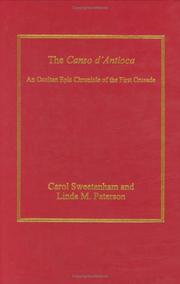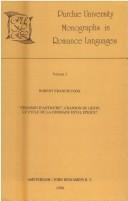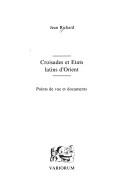| Listing 1 - 10 of 10 |
Sort by
|
Book
Year: 1977 Volume: 13 Publisher: Paris : Librairie orientaliste Paul Geuthner,
Abstract | Keywords | Export | Availability | Bookmark
 Loading...
Loading...Choose an application
- Reference Manager
- EndNote
- RefWorks (Direct export to RefWorks)
Book
Abstract | Keywords | Export | Availability | Bookmark
 Loading...
Loading...Choose an application
- Reference Manager
- EndNote
- RefWorks (Direct export to RefWorks)
Book
ISBN: 9782745321244 2745321242 Year: 2011 Volume: 33 Publisher: Paris: Champion,
Abstract | Keywords | Export | Availability | Bookmark
 Loading...
Loading...Choose an application
- Reference Manager
- EndNote
- RefWorks (Direct export to RefWorks)
Old French literature --- Chansons de geste --- Literature, Medieval --- French literature --- Littérature médiévale --- Littérature française --- Chanson d?Antioche --- Littérature médiévale --- Littérature française --- Chanson d'Antioche.
Book
ISBN: 9780754654896 9781409435709 9781315614526 9781317038757 9781317038764 9780367602062 Year: 2011 Volume: 22 Publisher: Farnham ; Burlington VT Ashgate
Abstract | Keywords | Export | Availability | Bookmark
 Loading...
Loading...Choose an application
- Reference Manager
- EndNote
- RefWorks (Direct export to RefWorks)
Poetry --- Theory of literary translation --- Comparative literature --- Thematology --- Old French literature --- Crusades --- Crusades in literature --- Chansons de geste --- History and criticism --- Chanson d'Antioche. --- Antioche, Chanson d' --- Antioche (Chanson de Geste) --- Canso d'Antioca

ISBN: 0754604101 Year: 2003 Publisher: Aldershot ; Burlington VT Ashgate
Abstract | Keywords | Export | Availability | Bookmark
 Loading...
Loading...Choose an application
- Reference Manager
- EndNote
- RefWorks (Direct export to RefWorks)
Croisades dans la littérature --- Crusades in literature --- Kruistochten in de literatuur --- Occitan poetry --- Crusades in literature. --- Crusades --- History and criticism. --- Canso d'Antioca --- Criticism, Textual. --- Criticism [Textual ] --- History and criticism --- First, 1096-1099 --- Sources --- Chanson d'Antioche --- Critique textuelle
Book
ISBN: 9782745326676 2745326678 Year: 2013 Volume: 110 Publisher: Paris: Champion,
Abstract | Keywords | Export | Availability | Bookmark
 Loading...
Loading...Choose an application
- Reference Manager
- EndNote
- RefWorks (Direct export to RefWorks)
Le premier cycle de la croisade engendre une écriture qui lance l`histoire de la communauté franque en Terre sainte. Dans les chansons d`Antioche, de Jérusalem et des Chétifs, considérer les corps des protagonistes, leur apparence, leur mode d`expression, leurs besoins et appétits, leur destinée enfin, permet de rencontrer cette idéologie en mouvement. Les repr ésentations organisent une discrimination des populations qui sort parfois de l`opposition manichéenne entre chevaliers croiséset Sarrasins. Le regard porté sur le corps des Tafurs, une troupe de gueux en marge des Francs, nuance l`antagonisme épique habituel et conduit à reconsidérer les enjeux idéologiques et génériques des œuvres.
Crusades in literature. --- Human body in literature. --- Epic poetry, French --- Chansons de geste --- French literature --- Croisades dans la littérature --- Corps humain dans la littérature --- Poésie épique française --- Littérature française --- History and criticism. --- Histoire et critique --- Chanson d'Antioche. --- Chanson de Jérusalem. --- Chétifs. --- Crusades in literature --- Human body in literature --- History and criticism --- Chanson d'Antioche --- Chanson de Jérusalem --- Chétifs --- Croisades dans la littérature --- Corps humain dans la littérature --- Poésie épique française --- Littérature française --- Chanson de Jérusalem. --- Chétifs. --- Epic poetry, French - History and criticism --- Chansons de geste - History and criticism --- French literature - To 1500 - History and criticism

ISBN: 9027217122 9789027217127 9786613359773 1283359774 9027281041 9789027281043 9781283359771 Year: 1980 Volume: 2 Publisher: Amsterdam: Benjamins,
Abstract | Keywords | Export | Availability | Bookmark
 Loading...
Loading...Choose an application
- Reference Manager
- EndNote
- RefWorks (Direct export to RefWorks)
Chansons de geste --- Epic poetry, French --- Crusades in literature --- Cycles (Literature) --- History and criticism --- Chanson d'Antioche --- Crusades in literature. --- Cycles (Literature). --- History and criticism. --- Chanson d'Antioche. --- Poetry --- Old French literature --- 840 "11" --- -Crusades --- -Cycles (Literature) --- -Literature --- Sequels (Literature) --- French epic poetry --- French poetry --- Church history --- Middle Ages --- Chivalry --- Epic poetry --- Legends --- Heldensage --- 840 "11" Franse literatuur--?"11" --- Franse literatuur--?"11" --- Romances --- -History and criticism --- -French epic poetry --- Literature --- Antioche, Chanson d' --- Antioche (Chanson de Geste) --- Canso d'Antioca --- Chansons de geste - History and criticism --- Epic poetry, French - History and criticism
Book
ISBN: 9782745316899 2745316893 Year: 2008 Volume: 86 Publisher: Paris: Champion,
Abstract | Keywords | Export | Availability | Bookmark
 Loading...
Loading...Choose an application
- Reference Manager
- EndNote
- RefWorks (Direct export to RefWorks)
Chansons de geste --- Crusades in literature --- French literature --- Space in literature --- Croisades dans la littérature --- Littérature française --- Espace dans la littérature --- History and criticism --- Themes, motives --- Histoire et critique --- Thèmes, motifs --- Chanson de Jérusalem --- Chanson d'Antioche --- Croisades dans la littérature --- Littérature française --- Espace dans la littérature --- Thèmes, motifs --- Chanson de Jérusalem --- Themes, motives.

ISBN: 0860783405 Year: 1992 Volume: 383 Publisher: Aldershot ; Brookfield Ashgate
Abstract | Keywords | Export | Availability | Bookmark
 Loading...
Loading...Choose an application
- Reference Manager
- EndNote
- RefWorks (Direct export to RefWorks)
Crusades --- Church history --- Middle Ages --- Chivalry --- Latin Orient --- East, Latin --- Latin East --- Orient, Latin --- Islamic Empire --- Middle East --- Orient --- Latin Empire, 1204-1261 --- History --- Latin Orient. --- HISTORIOGRAPHIE --- CLUNY (FRANCE) --- 1ERE CROISADE, 1096-1099 --- SAINT-GILLES (FAMILLE) --- TRIPOLITAINE (LYBIE) --- CHANSON D'ANTIOCHE --- CHANSON DE JERUSALEM --- CROISADES --- MEDITERRANEE (REGION) --- FRANCS --- CHYPRE --- TURCS --- CONSTANTINOPLE --- EGLISE ORTHODOXE --- ARMENIE --- FRANCE --- 19E SIECLE --- ABBAYE --- 11E SIECLE --- HISTOIRE --- 11E-14E SIECLES --- MOYEN AGE --- CRITIQUE ET INTERPRETATION --- 12E-14E SIECLES --- 12E-16E SIECLES --- 600-1500 (MOYEN AGE) --- HISTOIRE RELIGIEUSE --- 11E-13E SIECLES --- 11E-15E SIECLES --- 14E SIECLE --- CONDITIONS ECONOMIQUES --- HISTOIRE INTELLECTUELLE --- 15E SIECLE --- 12E-15E SIECLES
Book
ISBN: 180543151X 1783277335 Year: 2024 Publisher: Woodbridge : The Boydell Press,
Abstract | Keywords | Export | Availability | Bookmark
 Loading...
Loading...Choose an application
- Reference Manager
- EndNote
- RefWorks (Direct export to RefWorks)
This collection offers a holistic understanding of the impact of both crusading and settlement on the literary cultures of Latin Christendom. The period between the First Crusade and the collapse of the "crusader states" in the eastern Mediterranean was a crucial one for medieval historical writing. From the departure of the earliest crusading armies in 1096 to the Mamlūk conquest of the Latin states in the late thirteenth century, crusading activity, and the settlements it established and aimed to protect, generated a vast textual output, offering rich insights into the historiographical cultures of the Latin West and Latin East. However, modern scholarship on the crusades and the "crusader states" has tended to draw an artificial boundary between the two, even though medieval writers treated their histories as virtually indistinguishable. This volume places these spheres into dialogue with each other, looking at how individual crusading campaigns and the Frankish settlements in the eastern Mediterranean were depicted and remembered in the central Middle Ages. Its essays cover a geographical range that incorporates England, France, Germany, southern Italy and the Holy Land, and address such topics as gender, emotion, the natural world, crusading as an institution, origin myths, textual reception, forms of storytelling and historical genre. Bringing to the foreground neglected sources, methodologies, events and regions of textual production, the collection offers a holistic understanding of the impact of both crusading and settlement on the literary cultures of Latin Christendom.
HISTORY / Medieval. --- Albert of Aachen. --- Ambroise. --- Ascalon. --- Bohemond. --- Chanson de Jérusalem. --- Chanson des Chétifs. --- Chanson d’Antioche. --- Chronique d’Ernoul et de Bernard le Trésorier. --- Crusade Cycle. --- Dānishmendid. --- Estoire de la guerre sainte. --- Fulcher of Chartres. --- Geschichte des ersten Kreuzzuges. --- Gesta Francorum et aliorum Hierosolimitanorum. --- Godfrey of Bouillon. --- Heinrich von Sybel. --- Historia Hierosolymitana. --- Historia Ierosolimitana. --- Historia occidentalis. --- Itinerarium peregrinorum et gesta regis Ricardi. --- Jacques de Vitry. --- John of Joinville. --- Latin Christendom. --- Leopold von Ranke. --- Libellus de expugnatione Terrae Sanctae per Saladinum. --- Malik Ghāzī. --- Manuscript studies. --- Memory. --- Vernacular cultures. --- William of Tyre. --- historiography. --- Literature, Medieval --- Crusades in literature. --- History and criticism.
| Listing 1 - 10 of 10 |
Sort by
|

 Search
Search Feedback
Feedback About UniCat
About UniCat  Help
Help News
News